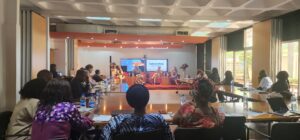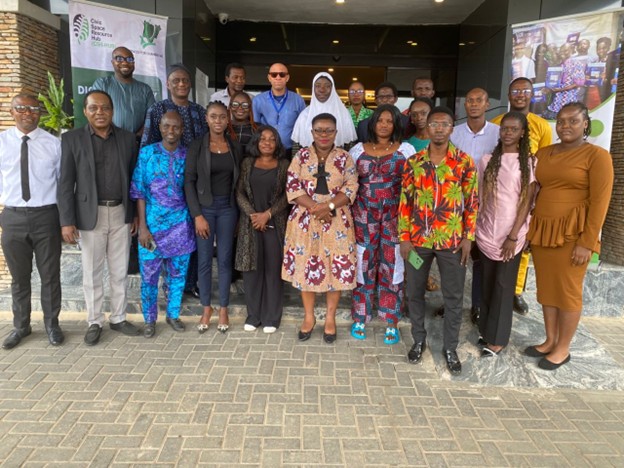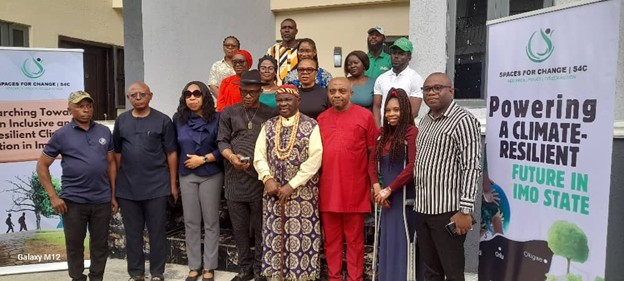Spaces for Change | S4C participated in Ford Foundation’s high-level convening for partners and grantees of the Building Institutions and Networks (BUILD) on May 9, 2023. The event held in Lagos, Nigeria, formed part of activities around the visit of the Executive Vice-president of Ford Foundation, Hillary Pennington, to the West Africa office. It afforded BUILD grantees the opportunity to reflect on their BUILD experience and share impactful stories of transformative action and social change in the West Africa sub-region. The event also featured reflections on the one-year successes and challenges of implementing the Weaving Resilience initiative in West Africa, christened the Civic Space Resource Hub (CSR-Hub).
BUILD is a multi-year initiative that focuses on strengthening the capacity of social justice organizations to achieve impact and advance systems change. During the opening session, participants appraised BUILD’s theory of change together, taking turns to share their institutional strengthening experiences according to their own context, unique features, and specialties. While most organizations have been able to enrich their talent pool, improve financial resilience and experience radical growth, significant challenges have also accompanied organizational progress. One example is the temptation to increase the organization’s scope of operations without adequate consideration for sustainability. BUILD grantees also grapple with the challenge of being perceived by their peers as an inexhaustible deposit of resources, and consequently, often bugged with a deluge of funding requests. Rounding off the BUILD session, participants identified some shocks and disruptions they have had to deal with during their BUILD journey ranging from insecurity, COVID-19, declining democratic values, and backsliding civic freedoms which have continued to shrink the spaces for civic participation in the subregion.
The panel discussion during the second segment of the convening focused on the implementation of the Ford Foundation-supported Civic Space Resource (CSR-Hub) managed by S4C and the West Africa Civil Society Institute (WACSI). Since its inception in May 2022, the CSR-Hub has delivered capacity-building programs to civil society organizations (CSOs), media practitioners, activists, and other civic space actors in Nigeria, Ghana, and Senegal. The initiative aims to strengthen the resilience and capacity of CSOs operating in restricted environments to operate securely and safely.
The CSR-Hub has four strategic pillars—Governance, Digital Security, Civic Space Protection, and Research and Knowledge-building. One year down the lane, the CSR-Hub has trained 144 organizations to meet their regulatory compliance needs. The Hub’s four mutually-reinforcing pillars have also increased the capacity of civic actors and organizations to effectively address their governance, regulatory, digital, and operational challenges.
Insightful presentations from S4C and WACSI also revealed that 32 organizations have received bespoke training that enabled them to protect themselves from varying forms of cyber-attacks and digital threats to their work. The Hub has extended the tracking of civic space incidents on the Closing Spaces Database –www.closingspaces.org– to the 16 countries in West Africa and has published a report analyzing the tracked incidents – West African Civic Space: Threats, Trends & Futures. The Hub’s 2022 Civic Space Outlook which provides early warning signals to civic actors has also been translated into 7 languages and a PWD-compliant format.
There are also challenges associated with implementing the Hub. The first is over-subscription to programs run under the four pillars. Secondly, the Hub receives capacity-building requests that fall outside the scope of planned interventions. Others include the urban-rural dichotomy, lower internet penetration and access to information by organizations in non-urban settings, difficulty in reaching under-represented groups, fear of reprisals, inflation, and so forth. S4C and WACSI responded to the series of questions fielded by participants.
The CSR-Hub is in its second year of implementation. The 5-year initiative will continue to roll out empowering initiatives under all four pillars to widen the reach to more civil society organizations in Nigeria, Ghana, and Senegal.




